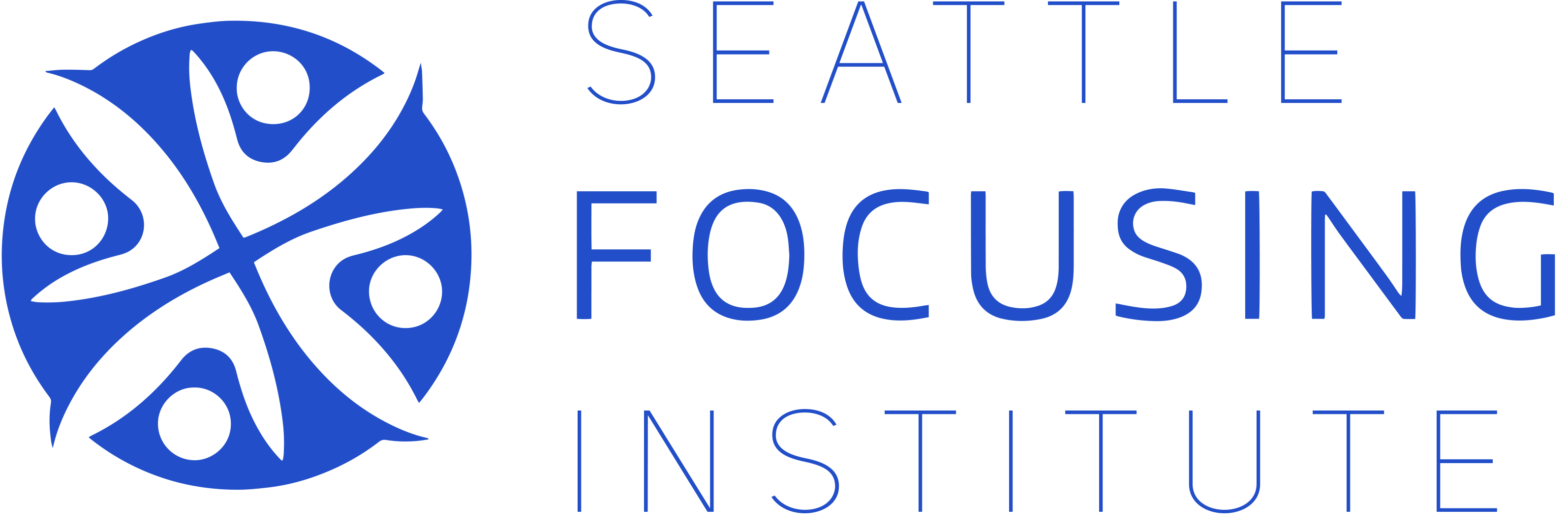Would you like to find and unlock your gifts as a healer?
You are the key to change. The main tool of therapy is the Self of the therapist.
Your emotional intelligence and presence are key to the healing relationship. Focusing allows you to be in touch with yourself in a way that deepens the therapeutic relationship and enables the client to trust and unfold their inner experience. Learning to sit with your client on the emerging yet unclear edge of a situation is where possibilities for growth occur.
Working with a felt sense opens up therapy
Focusing-Oriented Psychotherapy (FOT) is an embodied, relational, and process-oriented way of listening to and reflecting a client’s meaning, allowing the client to sense for something more about their whole situation. This bodily felt, holistic sense of a situation is referred to as a felt sense. This is the source of new and fresh information that leads to steps of change. The Seattle Focusing Institute offers an experiential Training Program that teaches healing professionals how to work with their own felt sense, then guide clients to find and trust their own inner knowing. The heavy burden of trauma:
Trauma creates a stoppage in our living process. It fragments our memory and identity. Some things are remembered while other aspects of our experience remain implicit in the body. Whether you want to talk about bottom up hijacking or right hemisphere disintegration, trauma orchestrates protective responses that obscure our memory, trigger our body, and haunt our mind. Without knowing how to help someone be present, access implicit memory, and unwind embodied experience, you are unlikely to unwind the core essence of trauma.
Three basic things need to occur for successful trauma treatment
- Clients need to be able to feel safe in their bodies so they can access somatic experience.
- They need a way to befriend and relationally be with embodied experience as it unfolds.
- They need to allow a bodily shift and action steps to fill in the missing experience beyond the previously frozen stoppage.
Focusing-Oriented Therapy helps clients learn to trust their body and feel again. New steps for growth are discovered at the uncomfortable edge of an experience. Too little contact with the uncomfortable edge and we skip over our experience and don’t learn anything new. Too much contact leads to overwhelm and re-traumatization. Guiding a client to befriend and keep company their inner aspects of fragmented experience is key to learning what got held up and what is needed to move forward.
What we discover on the journey
Trauma is not something to overcome, it is something that initiates us to a deeper experience of Self and connection to others. Focusing offers us a therapeutic and contemplative practice for both self-healing and working with others. The development of the Self of the therapist is an essential component in working with trauma. Unique gifts are discovered and inform the healing journey of the therapist and client alike.
Your life is not a problem to be solved, but a gift to be opened.
–Wayne Muller
Transformation for the healer
Therapists and healing professionals know and practice Focusing themselves and with Focusing partners. Focusing allows practitioners a practice of growth and transformation that supports their unique ways of working with others. FOT is based on the understanding that personal change supports the growth of the person in the direction of their unique unfolding. Students of FOT are not told how to do something, they are guided in deepening their own growth and how to facilitate that in others.
Integrating Focusing with what you already do
Students of Focusing are always encouraged to integrate Focusing with what they already do and know. All methods want to facilitate change. Focusing is the experiential edge of change as it occurs. It opens up each method’s potential by adding the crucial body-centered process of working with a felt sense. For example, FOT has been integrated with brief, solution-focused therapy, family systems, psychoanalysis, CBT, dream work, body work, art therapy, movement, yoga, Gestalt, somatic and existential therapies.
